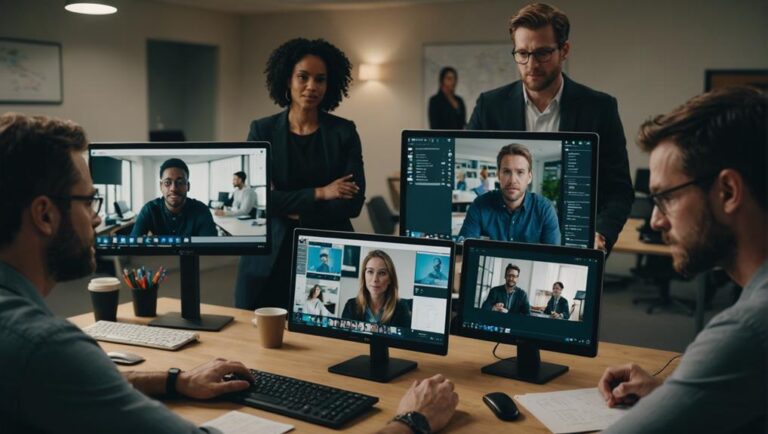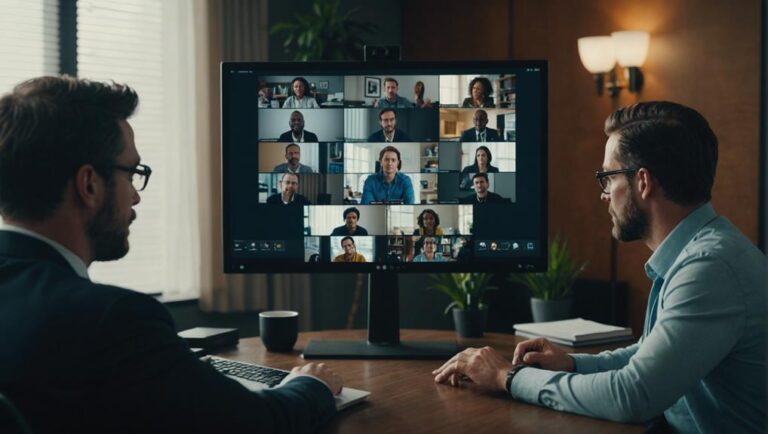Effective Communication Etiquette in Remote Teams
Mastering effective communication etiquette in remote teams is key for collaboration. Building trust is essential for open and honest interactions. Set clear expectations, like boundaries and project goals, for effective communication. Active listening, using appropriate channels, and managing time zones enhance communication quality. Celebrate team victories to boost morale and create camaraderie. In remote work settings, these etiquette aspects are essential for success and team cohesion.
Importance of Remote Communication Etiquette
Maintaining proper communication etiquette in remote teams is essential for fostering collaboration and productivity. Building trust among team members is a vital aspect of effective communication in virtual environments. When team members communicate respectfully, actively listen to one another, and show empathy, trust naturally grows. Trust lays the foundation for open and honest communication, leading to stronger relationships and increased collaboration.
Additionally, fostering collaboration in remote teams relies heavily on clear and courteous communication. By setting a positive tone in all interactions, team members can feel more comfortable sharing ideas, providing feedback, and working together towards common goals. Encouraging open communication channels and creating a supportive environment where everyone's voice is valued promotes collaboration and innovation within the team.
Setting Clear Expectations
To guarantee effective communication in remote teams, clarity in setting expectations is key. Establishing boundaries and clarifying responsibilities from the outset helps make sure that everyone is on the same page. Clearly define project objectives, timelines, and individual roles to avoid misunderstandings. By setting clear expectations, team members know what's required of them and can work towards common goals more efficiently.
When establishing boundaries, consider discussing availability hours, preferred communication channels, and how to handle urgent requests. Clearly outlining these boundaries helps prevent overworking and fosters a healthy work-life balance in remote teams. Additionally, clarifying responsibilities ensures that each team member understands their tasks and how they contribute to the overall project.
Regularly review and adjust expectations as needed to adapt to changing circumstances. Effective communication relies on everyone understanding their role and knowing what's expected of them. By setting clear expectations and responsibilities, remote teams can operate smoothly and achieve success.
Active Listening Techniques
Practice active listening techniques to enhance communication effectiveness in remote teams. Listening skills play an essential role in understanding your team members' perspectives and fostering a sense of connection.
When engaging in remote communication, pay attention not only to what's being said but also to nonverbal cues like tone of voice and body language. These cues can provide valuable insights into the emotions and intentions behind the words spoken, helping you respond appropriately and empathetically.
To demonstrate active listening, engage with your team members by asking clarifying questions and summarizing what they've shared. This shows that you're attentive and interested in their thoughts, promoting a more open and collaborative environment.
Additionally, practicing empathy by putting yourself in their shoes can help you better understand their feelings and viewpoints, leading to more meaningful interactions.
Choosing the Right Communication Channels
When communicating in remote teams, it's important to select the most appropriate communication channels for effective interaction. Utilizing video conferencing and instant messaging can facilitate real-time discussions, fostering a sense of immediacy and connection among team members.
Video conferencing allows for face-to-face interactions, promoting engagement and understanding through visual cues and body language. Instant messaging, on the other hand, offers quick exchanges that are ideal for brief updates or clarifications.
In addition to these essential options, email etiquette plays a vital role in remote team communication. Emails should be clear, concise, and professional to guarantee effective written correspondence.
Virtual meetings provide a platform for detailed discussions, presentations, and collaborative work sessions. Setting an agenda and establishing guidelines for virtual meetings can help maintain productivity and engagement.
Managing Time Zones Effectively
Consider the geographical spread of your remote team members when planning meetings to effectively manage time zones. Time zone coordination is vital when dealing with a global workforce to guarantee that virtual team meetings accommodate everyone.
Scheduling challenges arise due to different time zones, making it essential to find a suitable meeting time that works for all team members.
To manage time zones effectively, utilize tools like World Time Buddy or Google Calendar to schedule meetings that consider everyone's local time. When setting meeting times, aim for a middle ground that isn't too early or too late for any team member.
Additionally, rotating meeting times can help distribute the inconvenience of odd hours across all team members rather than burdening the same individuals repeatedly.
Providing Constructive Feedback
To enhance team collaboration and growth, providing constructive feedback is key in remote environments where effective communication is paramount. When delivering feedback in remote teams, it's important to focus on being specific and actionable. Address the behavior or outcome directly, offering suggestions for improvement to guide your team members effectively. Constructive feedback should be given promptly to make sure that the context is fresh and the issue is still relevant. This approach helps in nurturing a culture of continuous improvement within the team.
Feedback delivery plays a significant role in shaping team morale. By providing constructive criticism in a respectful and supportive manner, you can help team members feel valued and motivated to grow. Remember to acknowledge their efforts and highlight their strengths alongside areas for development. This balanced approach fosters a positive environment where feedback is seen as a tool for progress rather than criticism.
Emphasizing the importance of feedback in remote teams can lead to increased trust, clearer communication, and enhanced productivity.
Cultivating a Positive Tone
Foster a culture of positivity within your remote team by maintaining a cheerful and encouraging tone in all your communications. Importance management plays a crucial role in shaping team morale and fostering a collaborative environment. When engaging in virtual interactions, using positive language can greatly impact how your messages are received by team members.
Incorporating words of encouragement and appreciation can uplift spirits and motivate your colleagues, even from a distance. Simple phrases like 'great job' or 'thank you for your hard work' can go a long way in fostering a positive atmosphere within the team.
Additionally, using emoticons or emojis can help convey warmth and friendliness in written communication.
Resolving Conflicts Diplomatically
How can remote teams effectively navigate conflicts while maintaining professionalism and respect? Conflict resolution in remote teams is important for maintaining healthy team dynamics. When conflicts arise, it's critical to address them promptly and diplomatically to prevent any negative impact on team morale and productivity.
To resolve conflicts diplomatically, start by encouraging open communication among team members. Allow each person involved in the conflict to express their perspectives and feelings without interruptions. Active listening plays a significant role in understanding the root cause of the conflict and finding a suitable resolution that satisfies all parties involved.
In remote teams, it can be challenging to pick up on non-verbal cues, so it's crucial to clarify messages and avoid misunderstandings. Use video calls or voice chats when discussing conflicts to ensure a more personal and effective communication process.
Celebrating Team Successes
Celebrate your team's successes regularly to boost morale and foster a sense of achievement among team members. Team recognition plays an important role in remote work environments, where team members may feel isolated. Acknowledge achievements through virtual parties or video calls to create a sense of togetherness and appreciation.
When celebrating successes, make sure that recognition is specific and genuine. Highlight individual contributions within the team context to show appreciation for each member's efforts. By acknowledging and celebrating wins, you reinforce a positive work culture and motivate team members to continue excelling in their roles.
Virtual parties can be a fun and effective way to celebrate milestones. Encourage team members to share their achievements, play games, or simply socialize in a relaxed setting. These virtual gatherings not only celebrate success but also strengthen team bonds and boost morale.
Conclusion
So remember, in the world of remote teams, effective communication etiquette is key to success.
By setting clear expectations, actively listening, and choosing the right channels, you can avoid misunderstandings and foster a productive work environment.
And don't forget to celebrate those team successes – even if it's just a virtual high five. Because who doesn't love a good pat on the back from miles away?
Happy communicating!







